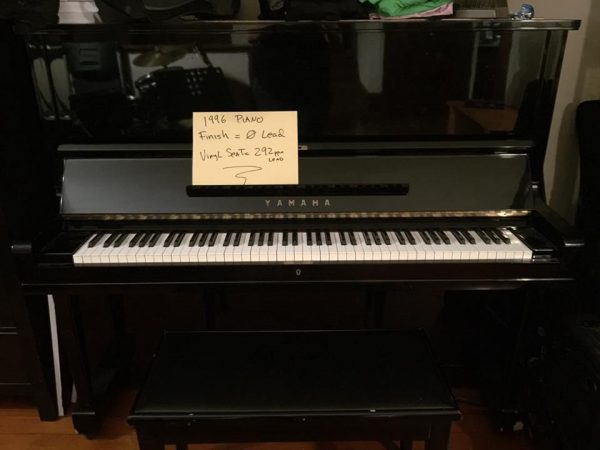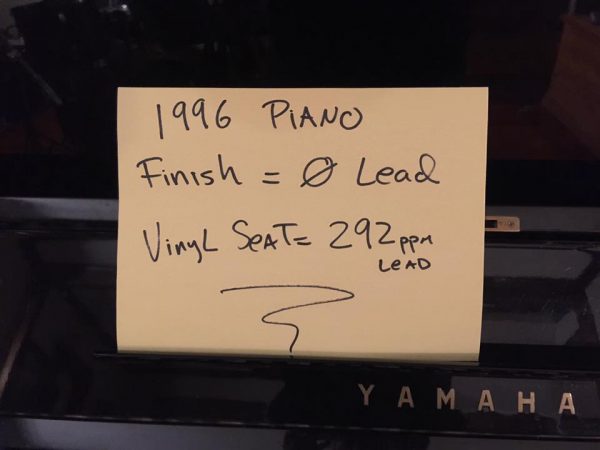1996 Piano
1996 | Bench | Fake Leather | Furniture | Piano | Vinyl | Vinyl Fabric | XRF Testing | XRFTesting
My piano! The finish was negative for lead. The vinyl of the seat was positive at 292 ppm lead. Vintage pianos are often very high lead. I have not tested many newer ones, but if this is any indication newer ones may have lead free finishes!
For those new to my site: 90 ppm (and above) is the level at which the CPSC has determined a consumer good to be unsafe for children.
If you appreciate my advocacy work, please consider donating even just $5 via my #GoFundMe! Link HERE! Thank you.

Never Miss an Important Article Again!
Join our Email List




Hi Tamara, I appreciate this testing was done sometime ago but I was wondering if you also tested the brass hardware on the piano, like the pedals and hinges? I also have a Yamaha Piano similar to yours (albeit younger model) and am curious to know if the brass contains any lead?
Wow! Just learned that they use leaded weights in the piano keys (not sure if in all pianos or mainly grands). I knew there were leaded weights somewhere but just discovered they are usually drilled into the sides of the black and white keys often in touchable areas while playing! The scariest part is reading the lead weights can bulge out of the wood due to expansion and rub up on neighboring key or another leaded weight which is lead (it appears lead is still being used in newer pianos?) and cause friction (bad) making the keys stick (in humid climates and or older pianos). I’ve watched repair work and they use powerdrills, files/chisels and other dusting/messy techniques to remove and refill the lead weights (some videos appeared to be completed in owners home-yikes!) . I’m seeing people also have this done based on preference/customization of action for the keys. Also watched videos about the lead oxidizing and it appeared to be dusting/crumbling apart! I had no idea 🙁
Perhaps Tamara has more insights into this, but am very bummed as my son loves to play, sometimes on others’ older pianos and here I was only worried about the age of piano and its paint job!
Some links that talk about this topic/pics:
https://www.lapianotuning.com/wordpress/?p=213
https://m.youtube.com/watch?v=Vak6o51L9RM
https://pianopricepoint.com/wp-content/uploads/2017/01/Piano-Key-Stick-Lead-Weight.jpg
https://1.bp.blogspot.com/-6jkjTk9yIf8/YW85ZpvzkhI/AAAAAAAAL-Q/L0DhB7kjZyAjWjS-2G5OYNeMCfbKBw3yACLcBGAsYHQ/s1024/weighted%2Bpiano%2Bkeys.jpg
I’m finding more good articles with pictures on this fascinating find (for me) regarding the piano’s leaded weights which are often fully exposed when simply pressing down a key! Think of all the little ones who bang on a piano and place hands in mouth, another viable source for poisoning if that weight is raw and fully leaded as it seems! People should know this should a technician come to fix their action or any sticking that they are working with straight lead in their homes!!
I read they’re putting even MORE leaded weights in newer pianos than before! Double yikes!
https://cazzbo.blogspot.com/2015/03/piano-lair.html?m=1
https://www.pianofinders.com/educational/touchweight.htm
Wow, I did not know that. My children have been playing on my piano from the 70’s when they were young. So, if I understand correctly, the lead can shed lead on the keys…
https://www.youtube.com/watch?v=_f98N7XoTiQ
Found another site (in addition to my other comments/videos in the comments) on how piano techs swap out key leads (pure lead I believe). I wish Tamara would comment about this as I see it could be a huge source of poisoning of children and most don’t have any idea they use leaded weights that appear to be touchable (oxidation concerns) and restoration work would definately disrupt the pure lead through grinding, shaving, replacing, etc.
https://www.youtube.com/watch?v=SjyvBkBsXKY
Quick Steinway video on how they drill in lead weights to the keys
Can’t help myself….keep finding worse and worse videos as I’m researching piano lessons for my child and cringing.
https://www.youtube.com/watch?v=L199Hrwvjkk
This man casually sands the corroded lead weights in his grand piano!
This video of a many power shaving a bulging pure lead weight in this piano is my equivalent of a horror movie. Says he’s seen a whole piano with sticking/jammed keys so sounds like a tech of sorts
https://www.youtube.com/watch?v=v-21OssJC5U
This one has a professional co. protocol for replacing the leads and at 2:40 mark is a great example/visual of the oxidation that can occur and the white powdered pure lead crumbling all over the piano
https://www.youtube.com/watch?v=rhz1FsS_Nig
I’ve spoken with several piano manufactures to inquire about the placement of the ‘leads’ (away from players hands or near grand vs upright etc) and they all tell me that there’s ‘no concern’ for lead exposure and a child would have to dig out the weights and eat them….um…NOT! I guess they haven’t seen the corrosion that occurs all the time and the manner in which techs fix this bio-hazardous problem I guess it’s a digital piano for us, but what about lessons 🙁
I would LOVE for the community (lead mamma and papa bears) to shed some light/awareness to the insanity of piano manufactures utilizing pure lead weights in order to put pressure on them to swap them for something less toxic! Awareness/education I believe is the key (pun intended). I’d love for some of these videos to go viral because I think people simply have NO idea (I know I didn’t!!)
I’ve tested probably 100+ pianos and have never found what I though might indicate lead dust concerns on the playing surface or exterior of the instrument (outside of concerns for some older pianos with Lead-containing finishes – and leaded brass elements.) I have found Lead dust under pianos but not in situations where one could distinguish if it were coming from the house / greater environment or the piano. Obviously it’s with further study – but I’ve even gone so far as lifting the lids of several pianos and testing underneath and haven’t found anything that could indicate hazards to the user.
Thank you so much Tamara for testing the pianos! This is so comforting. I was planning to buy a piano but this lead weight issue was holding me back as I have a 9 month old baby at home.
Thanks again and hope you are in good health!